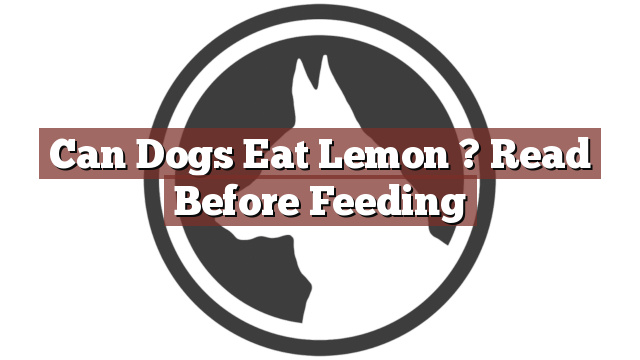Understanding Your Dog’s Dietary Needs
Before introducing any new food into your dog’s diet, it is crucial to understand their dietary needs. Dogs are primarily carnivores, and their bodies are designed to digest and absorb nutrients from meat. However, they can also benefit from a small amount of fruits and vegetables in their diet. These plant-based foods can provide essential vitamins, minerals, and fiber. Nevertheless, not all fruits and vegetables are safe for dogs to consume. It is important to be informed about what foods are suitable for your furry friend before offering them anything new.
Can Dogs Eat Lemon? Read Before Feeding
Can dogs eat lemon? This is a common question that many dog owners have. While lemons may be a popular citrus fruit for humans, it is best to think twice before sharing this tart treat with your furry companion. The answer is no, dogs should not eat lemons. Lemons contain citric acid, which can cause gastrointestinal upset, including vomiting and diarrhea, in dogs. Moreover, the high acidity of lemons can irritate a dog’s mouth and stomach lining, leading to discomfort and potential damage.
Pros and Cons of Feeding Lemon to Dogs
Although lemons are not recommended for dogs, there are some potential benefits and risks to consider. On the positive side, lemons contain vitamin C, which is essential for dogs, just as it is for humans. However, dogs naturally produce vitamin C in their bodies, so they do not require it from external sources like humans do. Additionally, the small amount of vitamin C found in lemons is not worth the potential risks associated with feeding them to dogs.
The cons of feeding lemons to dogs outweigh any potential benefits. The citric acid in lemons can disrupt the delicate balance of a dog’s digestive system, leading to gastrointestinal issues. Furthermore, the high acidity can damage the enamel of a dog’s teeth over time. It is also worth noting that the taste of lemons is not appealing to most dogs, and they may reject it altogether.
Conclusion: Proceed with Caution and Consult a Vet
In conclusion, it is best to avoid feeding lemons to dogs. The potential risks, such as gastrointestinal upset and tooth enamel damage, outweigh any minimal benefits. If you suspect your dog has ingested lemon or any other harmful substance, it is essential to seek veterinary advice immediately. Remember to always consult with your veterinarian before introducing any new food into your dog’s diet. They can provide the most accurate and tailored guidance based on your dog’s specific needs. Ensure your furry friend receives a balanced diet that meets their unique nutritional requirements, and you will help keep them happy and healthy for years to come.
Thank you for taking the time to read through our exploration of [page_title]. As every dog lover knows, our furry friends have unique dietary needs and responses, often varying from one canine to another. This is why it's paramount to approach any changes in their diet with caution and knowledge.
Before introducing any new treats or making alterations to your dog's diet based on our insights, it's crucial to consult with a veterinarian about [page_title]. Their expertise ensures that the choices you make are well-suited to your particular pet's health and well-being.
Even seemingly harmless foods can sometimes lead to allergic reactions or digestive issues, which is why monitoring your dog after introducing any new food item is essential.
The content provided here on [page_title] is crafted with care, thorough research, and a genuine love for dogs. Nevertheless, it serves as a general guideline and should not be considered a substitute for professional veterinary advice.
Always prioritize the expert insights of your veterinarian, and remember that the health and happiness of your furry companion come first.
May your journey with your pet continue to be filled with joy, love, and safe culinary adventures. Happy reading, and even happier snacking for your canine friend!

